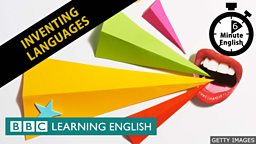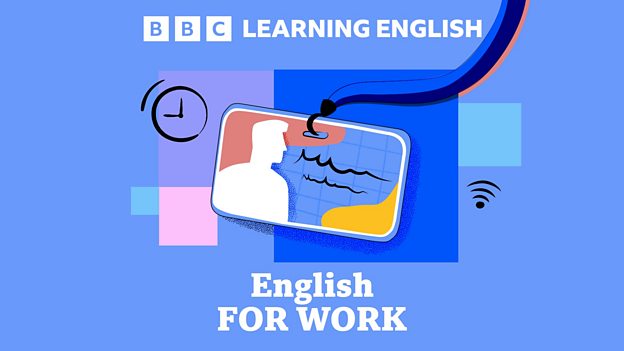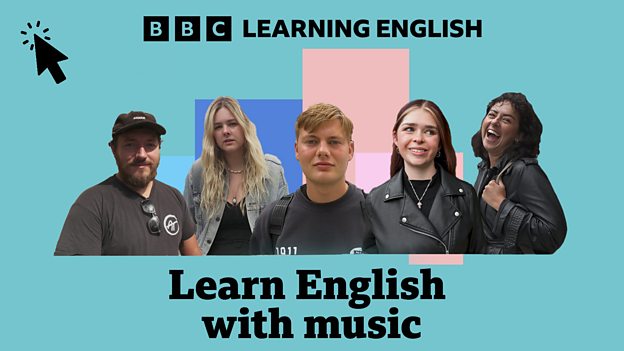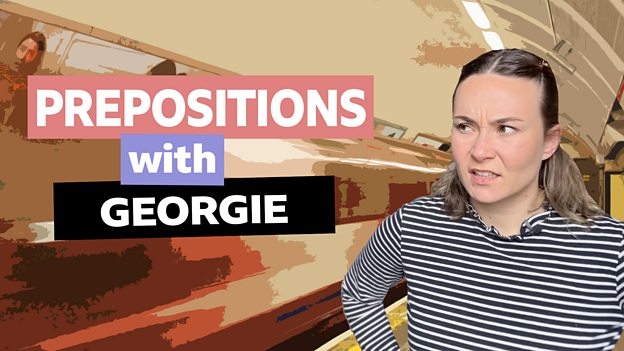6 Minute English
Intermediate level
Are artistic brains different?
Episode 221006 / 06 Oct 2022

Introduction
Does the brain of people with artistic abilities work differently from those who can't paint, draw or play any instrument? Sam and Neil talk about Mozart and teach you related vocabulary.
This week's question
Amadeus Mozart was considered a child prodigy - a young child with very great musical talent. So, how old was Mozart when he composed his first piece of music?
a) five years old
b) ten years old
c) fifteen years old
Listen to the programme to find out the answer.
Vocabulary
child prodigy
a young child with very great talent and ability in something
processing
making sense of the information your brain receives about the external world
gist
general, overall understanding of something, without the detail
tips
useful pieces of advice about how to do something
blown away
(informal) very impressed or pleasantly surprised by something
trainable
(US) capable of being taught or trained
TRANSCRIPT
Note: This is not a word-for-word transcript.
Neil
Hello. This is 6 Minute English from BBC Learning English. I’m Neil.
Sam
And I’m Sam.
Neil
Would you say you’re artistic, Sam? Can you draw or paint? Do you dance or play music?
Sam
I play the piano a bit. Yes, I’d say I’m quite artistic. How about you, Neil?
Neil
Well, if you count playing football as artistic then yes, but basically no – I can’t paint.
Sam
We’ve been wondering why artistic ability comes more naturally to some people than others, so in this programme we’ll be asking: are artists’ brains different? We’ll hear two expert opinions, and as usual, we’ll learn some useful new vocabulary as well. So, what do you think, Neil? Are artists’ brains different from other people’s?
Neil
I’m not sure, Sam, but it’s true that many artists behave differently, often in very strange ways. For example, did you know that Michelangelo worked so hard he never took a bath! Or that guitar legend, Jimi Hendrix, once set fire to his guitar on stage!
We’ll hear more about the artist’s brain soon, but first I have a question for you. As you said, artistic ability comes naturally to some people, including the famous composer, Wolfgang Amadeus Mozart. Mozart was considered a child prodigy - a young child with very great musical talent. So, how old was Mozart when he composed his first piece of music? Was he:
a) five years old?
b) ten years old? or,
c) fifteen years old?
Sam
I’ll guess he was a) five years old.
Neil
OK, Sam. I’ll reveal the answer later in the programme. If artists’ brains are different, it could mean they see the world in unusual ways. Dr Rebecca Chamberlain is a researcher in the neuroscience of art. She investigates how artists see the objects they are drawing by measuring saccades – the rapid movements our eyes make as they jump from one thing to another. Here she shares her findings with BBC World Service programme, CrowdScience.
Rebecca Chamberlain
Artists seem to be processing the visual world in a different way to non-artists, particularly when they’re drawing. The artist actually takes a more global approach to looking – so they make bigger saccades, bigger eye movements, and shorter fixations on the image. So, it’s almost like they’re getting much more of a kind of gist level view of the thing they’re looking at.
Sam
Rebecca’s experiments seem to confirm that artists’ brains work differently because of their processing of the visual world – the way their brains make sense of information. Interestingly, processing also means the act of developing pictures from photographic film.
Neil
When they draw, artists make bigger, quicker eye movements so they are able to see the whole picture, something also known as the gist – the overall, general impression of something without focussing on the details. If you ‘get the gist’ of what someone is saying, you understand the overall meaning of what they say, but not the details.
Sam
The second expert to answer our question about the artistic brain is Mike, a BBC World Service listener from Malawi. Mike is a self-taught painter who creates large, colourful pictures in his studio. According to him, artistic ability isn’t something you’re born with - it can be learned, as he explained to BBC World Service’s, CrowdScience.
Arts teacher Mike
I had this other student… he was really at the zero, like, he could not draw – at all. So, I gave him some tips, and in a month, he was really good – he was like really surprised, blown away, he never expected it. So, there are some things that are trainable, it’s like a bike. In my case, I learned how to do those things without anyone telling me, you know like, if you are drawing the face, the human face, the distance between your eyes is the same as one of your eyes.
Neil
Mike gives tips to his students – helpful pieces of advice about how to do something, in this case, to paint. After getting Mike’s tips, one of his students really improved and started painting much better. Mike was blown away – an informal way to say very impressed or surprised.
Sam
Like learning to ride a bike, Mike thinks that painting is trainable – a word from American English meaning that it can be taught or trained. For him, this is proof that artists’ brains are not so different after all.
Neil
So, there we have it – two different options, but no final answer to our question. Still, some scientists think there may be third possibility: everyone’s brain works by focussing on some areas and ignoring others, making a kind of jigsaw puzzle with missing pieces. Maybe all of us – you, me, Mozart and Jimi Hendrix - are just filling in the missing pieces our own way.
Sam
Speaking of Mozart, Neil, it’s time to reveal the answer to your question.
Neil
Right. I asked how old child prodigy Mozart was when he first composed music.
Sam
I said he was five years old… so, was I right?
Neil
Your answer was correct! Mozart was five when first wrote music, and by the age of six he had performed in front of the Emperor of Austria – twice! Now there’s an artistic brain!
Sam
OK, Neil, let’s recap the vocabulary from this programme, starting with child prodigy - a young child, like Mozart, with a great talent in something.
Neil
Processing describes how your brain makes sense of the information it receives.
Sam
The gist of something is a general understanding of it, without the details.
Neil
Tips are useful pieces of advice about how to do something better.
Sam
If you are blown away, you are very impressed or surprised by something.
Neil
And finally, trainable means able to be trained or taught, in American English.
Sam
Once again, our six minutes are up. It’s goodbye for now!
Neil
Goodbye!
Latest 6 Minute English

United against food waste
Episode 221229 / 16 Dec 2022
According to the UN, one third of the food we grow ends up in the rubbish bin - how can we stop this?
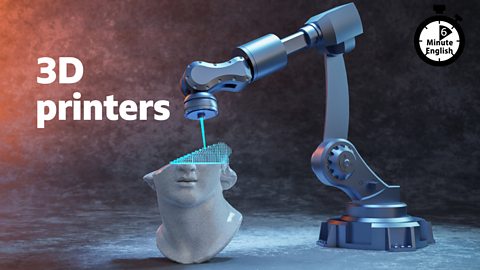
3D printers
Episode 221222 / 16 Dec 2022
How are 3D printers providing solutions to some of our medical problems?


Deep-sea mining: Good or bad for the planet?
Episode 221208 / 29 Nov 2022
Learn about an idea to deal with climate change that could affect marine ecosystems.

Can music mend a broken heart?
Episode 221201 / 24 Nov 2022
Is music really a cure for a broken heart?
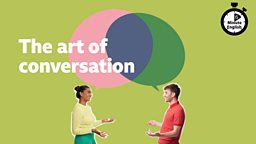
The art of conversation
Episode 221124 / 24 Nov 2022
We discuss whether the art of conversation is being lost in the era of social media

Qatar's World Cup workers
Episode 221117 / 17 Nov 2022
Hear about the workers who built the World Cup stadiums

Controlling the weather
Episode 221110 / 10 Nov 2022
How people are trying to manipulate the weather


Are Halloween costumes too scary?
Episode 221027 / 25 Oct 2022
We discuss whether Halloween costumes are now too scary to be fun.

Does climate change make you anxious?
Episode 221020 / 20 Oct 2022
We discuss how extreme weather events are affecting our mental health.

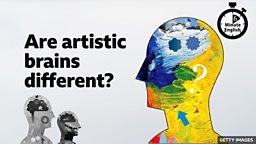
Are artistic brains different?
Episode 221006 / 06 Oct 2022
We talk about Mozart, Jimi Hendrix and teach you vocabulary.


English for dating online
Episode 220922 / 22 Sep 2022
We discuss the language used for online dating

Man vs beast: Who is more efficient?
Episode 220915 / 15 Sep 2022
We discuss the advantages of the design of the human body

Are you following your dreams?
Episode 220908 / 08 Sep 2022
Hear the inspiring story of people who are doing it

Do emojis make language better?
Episode 220901 / 01 Sep 2022
Are emojis turning us into lazy writers?

Being a beauty influencer
Episode 220825 / 25 Aug 2022
Hear about women who are using social media to change attitudes to beauty

Women in the workplace
Episode 220818 / 18 Aug 2022
Hear about the career-killing tasks that are holding women back in the workplace
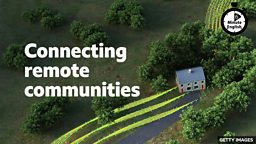
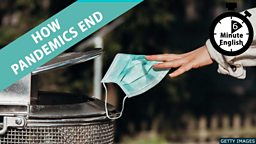
How pandemics end
Episode 220804 / 04 Aug 2022
We talk about previous periods in which deadly diseases went global

Confused by modern idioms?
Episode 220728 / 28 Jul 2022
Having a Groundhog Day? Keen to break the internet? Learn some modern idioms.

Which are more dangerous: sharks or humans?
Episode 220721 / 21 Jul 2022
How sharks have become an endangered species.

Climate change and animal evolution
Episode 220714 / 14 Jul 2022
Can today's animals evolve quickly enough to survive a changing climate?

Preserving traditional recipes
Episode 220707 / 07 Jul 2022
Missing your mother's cooking? We talk about traditional dishes.

Restoring trust in science
Episode 220630 / 30 Jun 2022
Astronomer Neil deGrasse Tyson's quest to highlight the difference between opinion and fact

The Manhattan Project
Episode 220623 / 23 Jun 2022
In this episode, we discuss the events leading to the creation of the first atomic bomb.

Island life: Is it paradise?
Episode 220616 / 16 Jun 2022
What is life really like in the Pacific islands?

The technology of translation
Episode 220609 / 31 May 2022
What is the relationship between translation, technology and the human brain?

Queen Elizabeth II: What is the Platinum Jubilee?
Episode 220602 / 02 Jun 2022
We talk about a very British tradition



Can VR treat fears and phobias?
Episode 220512 / 12 May 2022
Hear how tech is helping people change their behaviour for the better


Remembering Desmond Tutu
Episode 220428 / 28 Apr 2022
Deep convictions and a sense of humour - we talk about a man who helped end apartheid in South Africa.

Discoveries of the Deep Sea
Episode 220421 / 21 Apr 2022
We talk about an extreme environment which is stranger than fiction
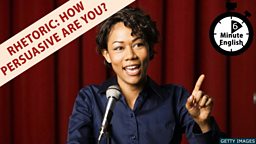
Rhetoric: How persuasive are you?
Episode 220414 / 14 Apr 2022
We talk about an art that started with ancient Greek philosophers

Britain's love affair with coffee
Episode 220407 / 07 Apr 2022
It's not all about tea. Britons love coffee too!

Optimists vs Pessimists
Episode 220331 / 11 Mar 2022
Listen to a conversation about optimists and pessimists

The world of Agatha Christie
Episode 220324 / 24 Mar 2022
Hear a chat about the queen of murder mystery, who had her books translated into over 100 languages


Why laughter is the best medicine
Episode 220310 / 10 Mar 2022
Shouldn't we take laughter more seriously?

Is being kind good for you?
Episode 220303 / 03 Mar 2022
Listen to what scientists are saying about the benefits of giving others a helping hand

Eating bugs
Episode 220224 / 24 Feb 2022
Would you eat a cricket? How about a portion of nice crunchy ants?


Do our pets care about us?
Episode 220210 / 10 Feb 2022
We wonder what all that licking is really all about

Sleepy in South Korea
Episode 220203 / 03 Feb 2022
Life in a place where people work, study longer hours and get less sleep than anywhere else

Preparing for the Beijing Winter Olympics
Episode 220127 / 27 Jan 2022
Artificial snow, coronavirus and controversy surround the Beijing Games starting soon.

Are personalised diets the best way to be healthy?
Episode 220120 / 20 Jan 2022
Learn how microbes help digest food and have an impact in our bodies.
